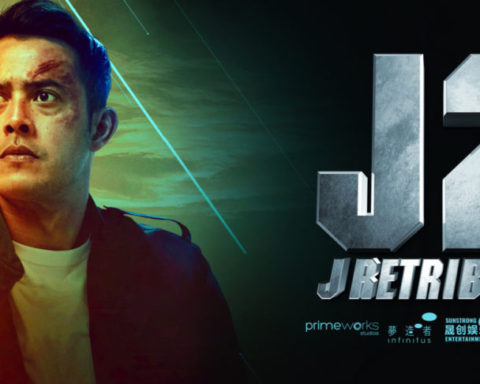A Beautiful Day in the Neighborhood, the incredibly moving story of one hardbitten reporter’s transformative encounter with the saintly Fred Rogers, is now streaming on Netflix, and we thought it was the perfect time to revisit the Oscar nominated drama.

Umapagan Ampikaipakan: I’m not sure how many people outside of the United States have heard of Mr. Rogers. I don’t remember watching his show growing up. We had Sesame Street and The Electric Company, but not Mr. Rogers’ Neighborhood. That being said, I don’t think you need any prior knowledge of who he is, or what he did, to appreciate the pure, unadulterated joy of this movie.
Bahir Yeusuff: That’s where I have some trouble recommending A Beautiful Day in the Neighborhood. I can’t decide whether or not people should watch the companion (?) documentary Won’t You Be My Neighbor before, or after, this movie. There certainly were points where I felt more invested, more emotional, and more involved in the character of Fred Rogers BECAUSE I had seen the documentary. There is, however, a certain amount of joy to be had in watching the movie first, and then getting the truth about the man behind the myth. Personally, I’m still wrestling with how to best recommend watching this movie. The only thing I can say is that you have to watch both. They are both great companion pieces to the other, regardless of the order you watch them in.
UA: The benefit of watching the documentary is the realisation that all of this was real. That Mr. Rogers was an actual, flesh and blood person. That he existed. That he was this completely uncynical, truly altruistic, human being, who was the epitome of all that was good. It’s impossible to tell people who Mr. Rogers is without having them roll their eyes. We’ve become so jaded with humanity that we can’t help but wonder: “What’s his deal? What game is he playing?” We can’t quite believe that he is everything he purports to be.
BY: Especially in this day and age when everyone with a dirty little secret has had their own personal facade (rightfully) shattered, there is a definite cynicism to the idea that a person like Mr. Rogers is possible. And that is something this movie does very well, to have Matthew Rhys’ character represent that jaded element of humanity. To have him play a journalist who has found success in mistrusting people in power (or in fame), and show to the world that everyone has a secret side. Until, of course, he meets Mr. Rogers.

UA: Which was the perfect way to tell this story. A cradle to grave biopic just wouldn’t have worked. And what director Marielle Heller, and screenwriters Noah Harpster and Micah Fitzerman-Blue, have so cleverly done, is to recognise their audience and then structure their narrative in a way that they would be most receptive to. Matthew Rhys is our surrogate in this movie. And his journey mirrors our own.
BY: But also in the way the movie is structured, opening as an episode of Mr. Rogers’ show, it asks questions of you the way not many other movies do. It shows you, the audience, why Matthew Rhys’ character is the cynical bastard he is, and asks what your excuse is. Well it certainly did me. And I didn’t have an answer for Mr. Rogers/Mr. Hanks. I don’t know why I didn’t trust Mr. Rogers. I don’t know why I was constantly expecting the other shoe to drop. That maybe he hit his wife. Or was secretly homosexual. Or liked children a little bit too much. Why am I such a cynical bastard Uma?
UA: We can’t help ourselves. We’ve been taught to be mistrustful. At some point over the last 50 or so years, once we discovered the truth about JFK, and Bill Cosby, and Mahathir, we began to question how much of what we know and see is merely a facade. We became sceptical and suspicious of anyone who may come across as being too good to be true. Which isn’t to say that Mr. Rogers wasn’t a complex and nuanced individual. He just seemed to have figured out a way to best deal with his inner demons. Whatever they may have been.
BY: And this is why I feel that watching the documentary before watching A Beautiful Day in the Neighborhood would help, because it gave me both an introduction to Mr. Rogers and his show, while also providing some historical context to where America was at the time. The country was a going through a dark time, and Mr. Rogers felt that not enough attention was being given to children, who had no way to deal with the wars, and deaths, and darkness of the world they were growing up in.

UA: His show, Mr. Rogers’ Neighborhood, is the kind of thing we will likely never see again on television. There is this method he employs when talking to his audience, to children all across America, which runs in conflict with everything you’re supposed to do on TV. His pace. His mannerism. His tone. The way he asks a question and pauses. As if he’s waiting for an answer. Because he knows that the kids on the other side of the screen are talking back to him. When he asks, “what did you do today?”, he knows that the little girl and boy watching are responding in real time. It’s genius in the way it creates a connection with the audience.
BY: There is also a bit he does, that is somewhat recreated in the movie, where Mr. Rogers is trying to teach kids about time, and how long 60 seconds is. So he just stares into the camera, out to the kids at home watching, and does nothing. Absolutely nothing. For 60 whole seconds. Which in TV, and in movies, is an absolute eternity to not be doing anything. Not talking. Not singing. Not dancing. Nothing. But Mr. Rogers holds it, for 60 seconds. There was a respect that he had for children. Like you said, never talking down, never treating them as less. He’s always listening to their opinions and their thoughts. Teaching them that their feelings are important.

UA: Which brings us to Tom Hanks…
BY: Who is perfect. And when you see Won’t You Be My Neighbor, you’ll realise just how eerily accurate his performance is.
UA: There is no one else who could have played this part. Not just because of how incredible an actor Hanks is, but also because he is the only one who feels worthy. Tom Hanks is, after all, the most trusted man in America. There is a parallel between how the world sees both these individuals. And I think that was absolutely necessary for this to work. Just imagine making a biopic about, let’s say, Jesus. Who would you cast? Who could carry that part? And would you be able to disconnect the actor from the role? Which is why it had to be Tom Hanks as Fred Rogers.
BY: Matthew Rhys is also brilliant as the journalist Tom Junod. God knows that in itself is a knife edge of a role. The audience has to understand Junod, but not hate him. Junod has baggage, but he isn’t completely blameless in his issues. And to have that cynicism not just completely devour the character, and the actor behind it, is just a wonderful piece of acting.

UA: I’ve seen this movie three times now and it makes me cry every time. At first, I thought it was because of the emotional journey that Tom Junod makes in these 109 minutes. He is broken in so many ways, and the way he finds salvation in Fred Rogers, and how that changes him, is truly moving. But I don’t think that’s why I was crying. I think I was crying because watching it made me realise everything we had lost. There is a way of looking at the world, as espoused by Mr. Rogers, that is truly beautiful. And it isn’t naive, or in any way ignorant of reality. It’s just about looking for the good and helping others find it too. I can’t think of anyone who practices that. Not in the same way. Not anymore.
BY: And that is the reality of our world isn’t it? That we can no longer trust people when they tell us that things will be okay. Be they presidents, prime ministers, musicians, actors, movie executives (although, if you were taking life advice from a movie executive you definitely have other issues to deal with), or news anchors. But A Beautiful Day in the Neighborhood reminds you that not everything needs to be evil. Not everyone is trying to steal your wallet, your vote, or your underwear. That there is good in the world, and to see that, you too have to be that good in the world. Just like Mr. Rogers was.
UA: Which is precisely why I think A Beautiful Day in the Neighborhood is such an important movie. It reminds us to be empathetic. It forces us to step out of our own shoes for just a moment and consider the point of view of the person standing next to us. Not just to be tolerant of others, but to try and understand them, and where they’re coming from. God knows it’ll go a long way in helping us be less judgmental toward our neighbors.
BY: I think it’s safe to say we both feel this movie is an important watch. Not in a zeitgeist, Tenet sort of way, but in a genuine, being a better human sort of way. If we can all just be a little less cynical of each other, maybe we can all live in Mr. Rogers neighborhood.
A Beautiful Day in the Neighborhood
109 Minutes
Director: Marielle Heller
Writers: Micah Fitzerman-Blue and Noah Harpster
Cast: Tom Hanks, Matthew Rhys, Susan Kelechi Watson, and Chris Cooper












Follow Us